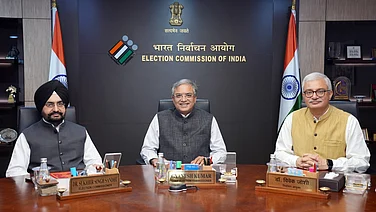On the eve of International Women's Day on Tuesday, the WHO called for intensified action in Southeast Asia and the rest of the world to ensure that every woman and girl has equitable access to digital innovations that can support health and well-being.
For both women and men, digital innovations and technologies hold immense potential to increase access to essential health services and improve health and well-being, said Poonam Khetrapal Singh, World Health Organisation's Regional Director for South-East Asia.
However, gender inequality constrains the ability of women and girls to benefit, compounding existing inequities in health outcomes, she said.
An estimated 61 per cent of women in the Asia Pacific use the internet, compared to 75 per cent of men. Women are about 12 per cent less likely to own mobile phones than men, and among those who don't own mobile phones, women outnumber men by 39 per cent, Singh said in a statement.
Women are under-represented in technology sector jobs and leadership roles, which could lead to unconscious bias in the design and development of new digital products, including for health and well-being.
In 2022, women comprised 33 per cent of the workforce in the 20 largest global technology companies. However, they held just one in four leadership positions, Singh said.
Similar disparities exist in the health workforce, she said, adding that women comprise about 70 per cent of the global health workforce but hold just 25 per cent of the senior roles.
This could impact the design and delivery of digital health and other interventions, as well as health policies and systems more broadly, she said.
WHO analysis shows that women leaders often expand the health agenda, strengthening health for all and targeting health inequities.
Gender-sensitive assessments and gender-responsive interventions should be applied to enhance health and health equity, and an increased role for women in the digital health space should be actively pursued to accelerate health for all and gender equality more broadly, Singh said.
The Covid-19 pandemic has exacerbated existing gender inequalities, and by one estimate, it has increased the time it will take to achieve gender equality globally from 100 years to 132 years, she said.
However, new digital tools in health and other sectors can help close the gap and accelerate progress towards gender equality – but only if they are appropriately designed and delivered, and accessible to all women and girls, she said.
WHO Calls For Intensified Action To Ensure Equitable Access To Digital Innovations For Women, Girls
International Women's Day is on Tuesday, and on eve of that day, the WHO called for increased digital innovation access for women and girls in Southeast Asia and around the world.

Womens Day
Womens Day
Published At:
- Previous Story
 EC Orders Transfer Of Officials In Bengal Serving For Over 3 years In Same Place Ahead Of Polls
EC Orders Transfer Of Officials In Bengal Serving For Over 3 years In Same Place Ahead Of Polls - Next Story
MOST POPULAR
WATCH
MORE FROM THE AUTHOR
PHOTOS
×





















